Scheduled Rebills - Flexstats
The Scheduled Rebills Report displays the total number of subscriptions and sales for projected rebills, by time period. This report is for informational purposes only as the status of a subscription may change in the select period.
To access the Scheduled Rebills report:
1. Sign in to the Admin Portal.
2. Use the dropdown menu to select an individual subaccount or select All to review data for the entire account.
3. Click Reports.
4. Select Scheduled Rebills - FlexStats.
5. Click Open Report.
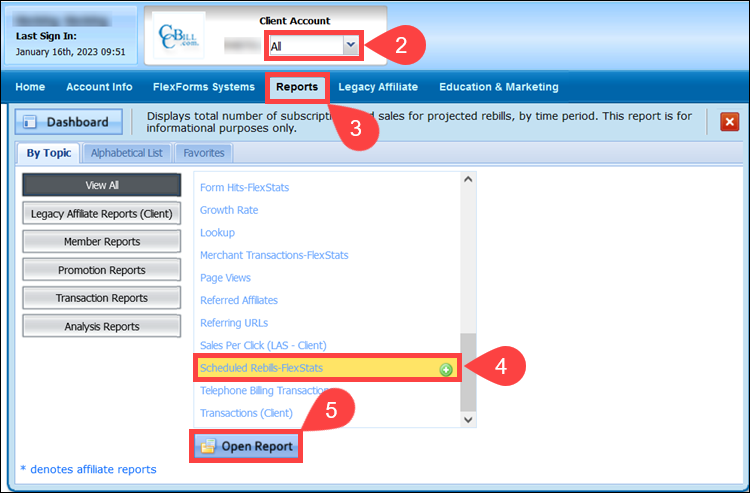
The report loads Quick Stats at the top and displays data for Tomorrow, Next 7 Days, Next 14 Days, Next 30 Days, and Next 90 Days.
Next 7 Days is already selected by default and the data is charted in a graph below the Quick Stats section.

Each individual breakdown displays the following:
- Count. The number of rebills scheduled for the indicated timeframe.
- Total $USD. The total dollar amount of rebills scheduled for the timeframe indicated.
The Graph It button below each time period allows you to quickly load a graph based on that particular time period.

Using Graphs
The graphing tools are located immediately below the Quick Stats section of the report.

The following sections explain the various options available to you when selecting graphing options. Once you’ve selected all your desired options, select the Go! button to load the customized graph.
Main Filters
The graph displayed is fully filterable, allowing you to design a graph with only the data you need. By default, ALL options are pre-selected for you. You may change the data you wish to have displayed in the graph by clicking the All On button.
Clicking the button loads the filter settings for the graph. You can deselect any unwanted items in the Transaction Types column and the Payment Types column, and you can choose to filter by Days of the Week and Countries as well.
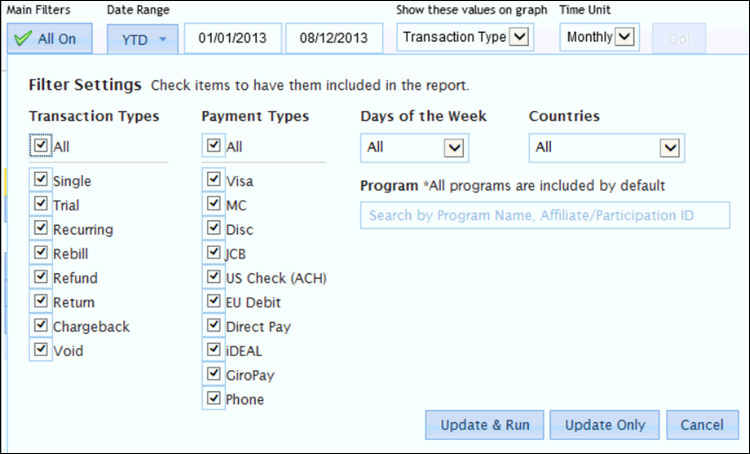
Once you have selected all the desired options, click one of the action buttons at the bottom:
- Update & Run. This option closes the filter options and immediately runs the report with the new filters.
- Update Only. This option saves your filter choices and returns you to the Graphing Options to select further options for the graph run.
- Cancel. This option disregards your changes and removes the Filter Settings menu from view.
Date Range
The Date Range menu allows you to select specific dates to include in your graph or to create a custom date range. To activate this filter menu, click the button beneath Date Range in the Graphing Options (the button label changes based on your selections).
Because this report is designed for future transactions, you cannot select a date range in the past.
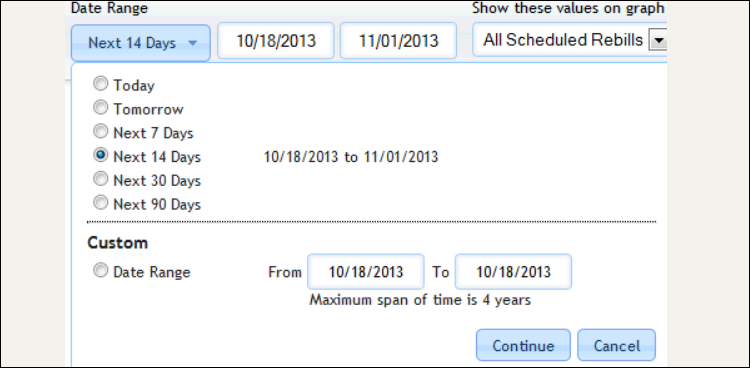
After selecting or entering your date range information, click one of the following buttons:
- Continue. Selecting this option saves your choices and returns you to the main Graphing Options menu.
- Cancel. Discards your changes and returns you to the main Graphing Options menu.
You can easily change the date range without using this drop-down by entering your own custom date range in the two fields next to the drop-down in the Graphing Options menu.
Values
The drop-down menu beneath Show these values on graph allows you to decide which values you want to view. Select from the following:
- All Scheduled Rebills
- Payment Type
- Currency
- Region
- Country
- Rebill #
- Affiliate ID Yes/No
Time Unit
The report can display data in the following time units:
- Weekly
- Daily
Chart Tweaking, Use, and Legend
Once you have loaded a customized graph, you can use the options on the left of the graph to further refine your view.
The Scale section allows you to toggle the graph between Count and Amount.
- Count: how many transactions of the selected type were processed
- Amount: how much is the total of the transactions of the selected type.
The selected scale information is represented on the X-axis of the chart.
The Time Unit section allows you to quickly break the graph down into other time units. Be aware that time units can make the graphs difficult to read when you select a broad time range in the Graphing Options and then select a detailed time unit from this menu. Viewing hourly data is best done with a daily graph as opposed to a WTD, MTD, or YTD report. The time unit is represented on the Y-Axis of the chart.
These charts are interactive. Hovering over any point on the chart will provide you with pop-up details about the plotted point.
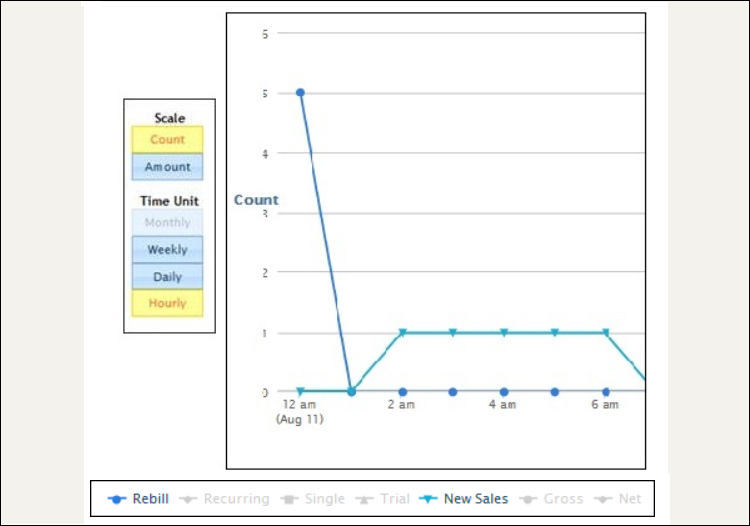
The bottom of the chart provides you with a legend for the plotted data to help you better understand your chart.
In the legend below, the greyed-out icons indicate items not included in the chart. The items in color indicate that both Rebills and New Sales are included in the chart above, and display the line color and plot icon used for those transaction types.
Working with Graphs
For each action performed, the system loads not only the chart that you see immediately but if you scroll down that you will see that it also loads a Snapshot Graph based on your options and a Legend/List with more details.
The graphs display income and deductions color-coded to differentiate rebills, recurring, single, trial, chargeback, refund, void, and return transactions. The pie chart default can be changed to a bar chart by selecting the corresponding icon in the bottom left of the screen.
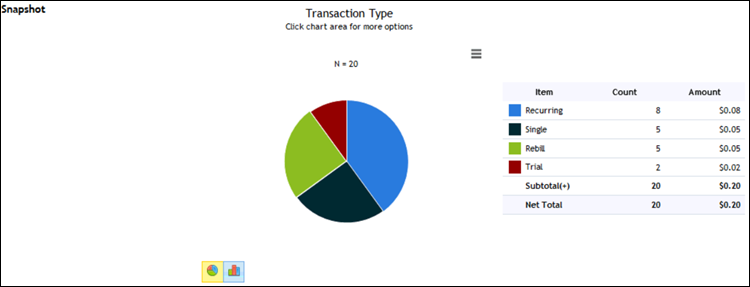
Hovering over an item in either report will provide you with further details about the graph area.
Breakdown By
If you have experience with CCBill’s reporting system, you know that there is always a way to further break down reports. With these new reports the Breakdown By happens in the pie or bar charts.
After loading the report, scroll to the bottom and locate the item on the graph that you wish to view breakdown details about, then click that item. A small Breakdown By menu pops up.
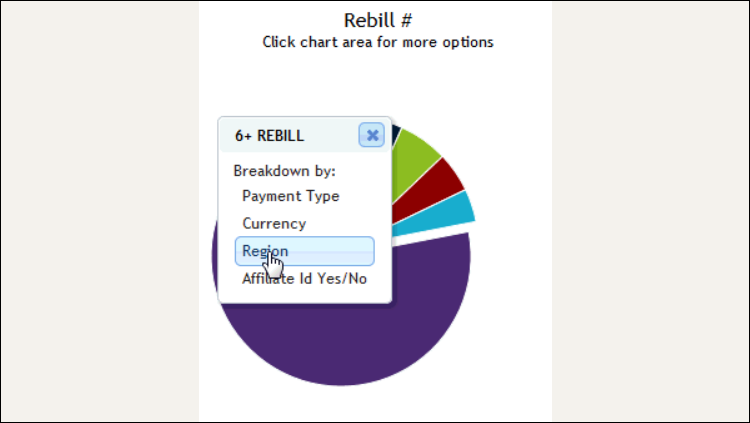
Once you select an item from the Breakdown By menu, another graph will load at the bottom of the page. This example breaks down the 6+ Rebill section by Payment Type.
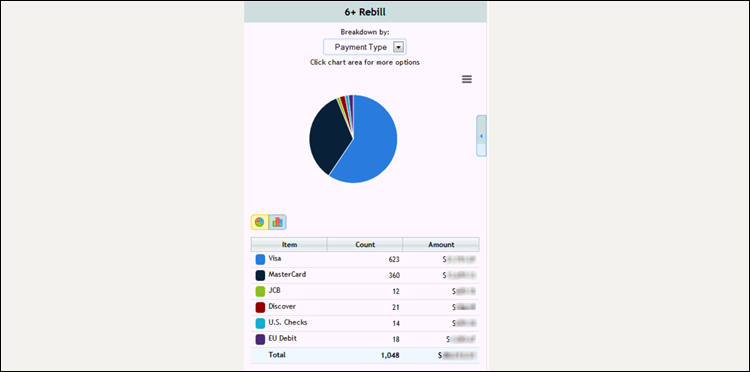
You have the option at the bottom left of the graph to toggle between pie and bar graphs, and the items in the graph are fully color-coded and defined in the list below the chart.
The Breakdown By drop-down menu can be changed to one of the other available options to immediately refresh the graph with new breakdown data.
You can further break down this report by clicking on one of the Slices/Bars in the graph and selecting an additional breakdown by option. The new breakdown will load to the right of the original.
Click the X to close any of the breakdown graphs. Running a new breakdown from the first listed graph will clear the previous breakdown options from the screen.
Saving Graphs
All the graphs that you create using the methods above can be downloaded for later use. Click on the icon next to the graph, then select the format you wish to save the graph as from the drop-down menu.
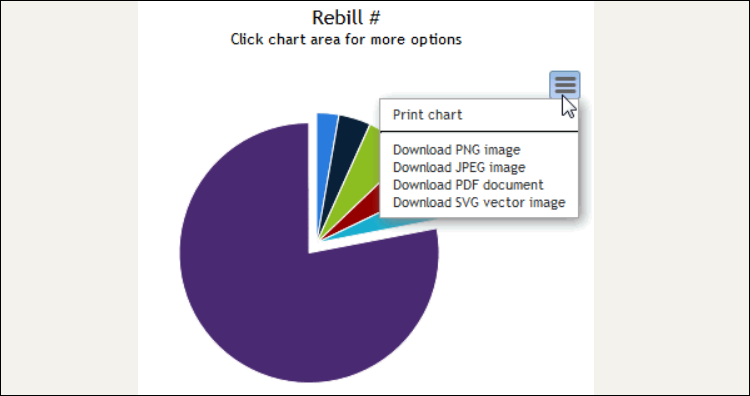
Follow the on-screen prompts to save the file to your computer.